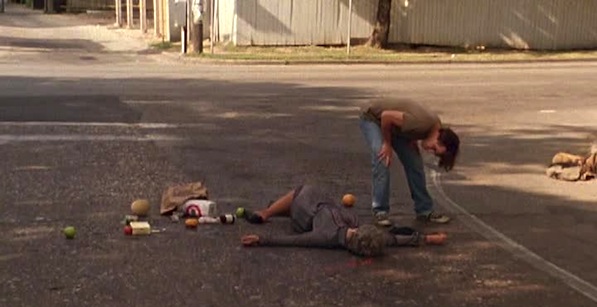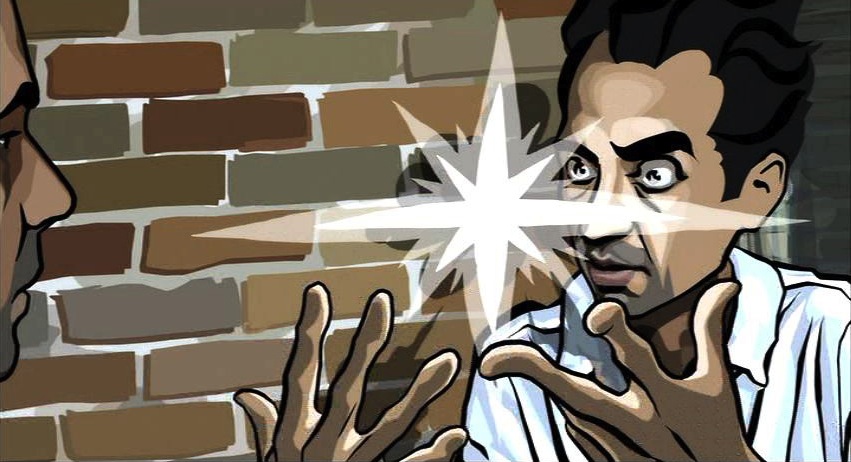For more than a quarter century, Richard Linklater has been delighting and surprising audiences as he holds a mirror to his generation. From Slacker to Bernie, from The School of Rock to the Before Sunrise/Sunset/Midnight series, he’s entertained us with a trademark, almost spiritual mix of philosophy and humor. We took the opportunity of his fifty-third birthday to ask a few collaborators to share their own personal memories of working with Rick, and what we got back from friends Caveh Zahedi and Brecht Andersch reflects well on Linklater’s beginnings while repositioning his ends. As Andersch says, “The satiric bent characterized by the film’s name-change to Slacker unfortunately has covered over its central theme: young people struggling towards (or sometimes meandering to) the ‘true call:’ lives self-determined and worth living, unshackled to the demands and constrictions of society. Rick was alive to this hunger, and embodied it himself, and was therefore the perfect person to deliver this clarion call, by way of becoming an artist.”
Brecht Andersch:
In the spring of 1989, Rick Linklater showed some of us in his coterie notes for a project he was working on. On the front and back of two giant pieces of cardstock, printed in the tiny font of some now-obscure word-processing system, were scene-by-scene details for a feature-film to be shot in 16mm, entitled No Longer/Not Yet. There were far more scenes than could be fit into even a vast Berlin Alexanderplatz-sized epic, and although each was rendered vividly, they were all sketchy, with barely a line or two of dialog worked out. Having just gotten my feet wet in film production, I couldn’t figure out how he planned to get this shot—there were sequences on (for us) a seemingly-vast budgetary scale, with details like exploding gas stations. Despite my concerns, it was the most impressive document I’d ever held in my hands: every element seemed designed to fire up the imagination of us proto-Gen X-ers, and to intimidate naysayers with its seriousness. I knew a number of extremely intelligent and talented people in those days, but Rick was the most charismatic among those whose talents weren’t fully revealed, and there was a feeling, as I held those two weighty pieces of pale cardstock, that his time was on the horizon.
Rick invited his friends to join in his project in whatever capacity they could; I was working full-time at a bakery, saving money for my own feature project, so I elected to just help out as I could (including almost daily deliveries of day-old baked goods from the bakery, delivered on my bicycle). I vividly remember the day the sequence in which the young man who runs over his mother was shot in front of the house I’d shared at one time with Rick and DP Lee Daniel. I’d recruited the actress who played the mother to the film, and delighted in pouring out the Pace Picante salsa (which was the gore special effect supposedly emitting from her head) onto the sidewalk. Most importantly, Rick needed his friends to act in his movie, and to help scour Austin for exciting personalities. Characters were created and filmed, then re-written and collapsed with others, and filmed yet again. It was a highly organic process, and, although I couldn’t have consciously understood or expressed it at the time, one could feel a generation coming alive that summer, before and behind the camera. In those days, in Austin, living for young people was cheap, and a dedicated band of folks working for deferred pay collected around Rick’s project. The satiric bent characterized by the film’s name-change to Slacker unfortunately has covered over its central theme: young people struggling towards (or sometimes meandering to) the “true call:” lives self-determined and worth living, unshackled to the demands and constrictions of society. Rick was alive to this hunger, and embodied it himself, and was therefore the perfect person to deliver this clarion call, by way of becoming an artist.
Caveh Zahedi:
I first met Rick at the Sundance Film Festival in 1991. We both had films in competition—I was there with A Little Stiff and he was there with Slacker. I liked him right away. We both lost (Todd Haynes’ Poison won that year), but became friends.
When I shot I Don’t Hate Las Vegas Anymore, he kindly offered me the use of his non-linear editing system, so I spent a couple of months at the Detour office in Austin. We played a lot of ping-pong that summer (he is one of the best ping pong players I have ever met) and watched a lot of films (he is one of the most film-literate people I know).
One day, he asked me to act in Waking Life. He sent me a script but I told him I was incapable of speaking the lines he had written. He told me to feel free to change it.
I came up with four different monologues. I flew to Austin and, the night before the shoot, I “auditioned” the monologues. He told me he liked all of them and that we might as well shoot them all.
On the day of the shoot, Rick told me to run through the four monologues just as a warm up for the camera people to figure out how to block the scene. I did the four monologues and, when I was finished, he said, “Great, we got it.”
“But I thought that was a warm-up.”
“I just said that so you wouldn’t get too self-conscious.”
He’d tricked me, but I was glad he did.






